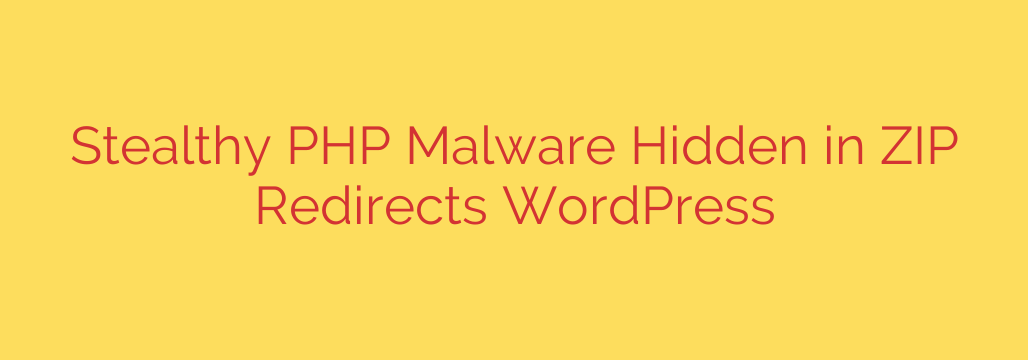
Protecting a WordPress website requires constant vigilance, especially against evolving threats. One particularly insidious form of compromise that has been observed involves stealthy PHP malware hidden within seemingly innocuous ZIP archives, designed to force malicious redirects on unsuspecting visitors.
This type of attack is effective precisely because of its stealth. Rather than injecting obvious malicious code directly into common files, the attackers embed harmful PHP scripts within ZIP files. These archives might be uploaded through compromised administrative panels, vulnerabilities in themes or plugins, or even placed directly onto the server via stolen FTP credentials. The PHP code within is often highly obfuscated, making it difficult for standard scans or manual inspection to immediately identify its malicious purpose.
Once in place, this hidden PHP script is activated. Its primary function is typically to hijack website traffic by implementing malicious redirects. When a user visits an infected page, they are instantly sent to a different, harmful site – often promoting scams, distributing malware, attempting phishing attacks, or displaying unwanted advertisements.
The impact on a website owner is significant. Malicious redirects severely damage user trust and can lead to a sharp decline in search engine rankings, as platforms like Google penalize sites that exhibit such behavior. The site may even be blacklisted by security vendors and browsers, displaying warnings to potential visitors.
Detecting this specific threat requires diligence. Automated security scanning is crucial, but administrators should also be aware of less obvious signs. Look for suspicious ZIP files or other archives in unusual directories (like the uploads folder) or recently modified core WordPress directories, themes, or plugins. Manually inspecting recently changed PHP files for unusual, heavily obfuscated code can also uncover hidden scripts. Monitoring website traffic for unexpected redirects and reviewing server access logs for unusual activity are also key detection methods.
Cleaning up such an infection involves identifying and removing the malicious ZIP archives and any activated PHP scripts. Often, simply deleting the ZIP file isn’t enough; the embedded PHP might have been extracted or activated elsewhere. Replacing infected files with clean versions from trusted sources (like fresh WordPress downloads, theme/plugin repositories) is often necessary.
Preventing these kinds of attacks boils down to fundamental security practices:
- Keep WordPress core, themes, and plugins meticulously updated to patch known vulnerabilities.
- Use strong, unique passwords for all user accounts, especially administrators, and hosting panels.
- Implement two-factor authentication wherever possible.
- Use a reputable security plugin that offers malware scanning and firewall protection.
- Regularly back up your entire website so you can restore a clean version if compromised.
- Limit file permissions to prevent writing/executing in sensitive areas.
Staying informed about the methods attackers use, like hiding malware in unexpected file types and locations, is vital for maintaining a secure online presence. Proactive monitoring and rapid response are key to mitigating the damage from such stealthy threats.
Source: https://blog.sucuri.net/2025/07/stealthy-php-malware-uses-zip-archive-to-redirect-wordpress-visitors.html








